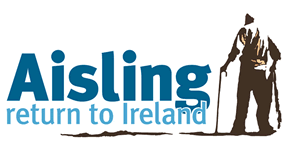The Coordinator considers different generations of emigration and recommends some books for your attention
The last few months have been productive for Aisling featuring a very successful trip to Wicklow (see Cats and Crows). Many of the people we work with have suffered from a bad experience of emigration and as such find it very hard to go back home after so long away. Our whole purpose is to make this happen in the simplest way that we can. That is to load up a couple of minibuses with people and drive to Ireland. It’s that simple but like all simple solutions therein lies months of careful preparation, coaxing and encouragement and often as the date of departure looms up many pull out, sometimes at the last minute through nerves and fear of the great unknown, for how else can we describe our country of birth which we spend inordinate time thinking about, reading about and talking about if we never visit. It has to be said that the Irish certainly keep up with the news from home after they leave but almost uniquely among other emigrant communities some of us fall out of contact or never go home once the tie has been broken. The tie can be the parents or the family home but it can break very easily and once broken it is very difficult to mend.
We wrote about Pat in the latest post about our Wicklow trip who sadly didn’t make it on the trip but we have hopes of future trips. Pat is a man who is very secretive and has managed to stay out of the shadows cast by officialdom since he arrived in England 50 odd years ago. It is an incredible achievement to have survived this long without a bank account or receiving benefits and, at least at present, no place to live. Men like Pat were once known as ‘long distance men’ because they travelled the country looking for work. You can read about them in ‘Children of the Dead End’ by Patrick Magill (https://www.goodreads.com/author/show/156858.Patrick_MacGill). The other name used was ‘Tramp Navvy’ because before Facebook and Twitter the jungle grapevine was in operation and these kings of the road had enough confidence in it to spend weeks tramping the country on the chance of getting a job on a road laying job or a hydro-dam on the other side of the country. Nowadays anyone hoping to get a position on a construction site will have to have the proper safety certificates and must apply through the human resources team. In recent years Pat had worked for Travellers mostly who still use the cash-only system of casual labour. Tom, who we took to Mayo for his brother’s funeral in February, was also a man who only understood the old way of operating and years ago he would come to me with a few scraps of paper on which were written phone numbers of various contractors he had worked for over the years. Once the call was put through there were no words of introduction or pleasantries just the stark nitty gritty, ‘Do you have the start?’ was all Tom wanted to know.
Another book well worth reading on the subject is ‘The Men who Built Britain’ by Ultan Cowley (http://www.ultancowley.com/) which is pretty much the definitive word on the subject of Irish labour in Britain. There are distinct periods to mass emigration and the history of Irish labour which tend to occur when the time is right through factors at home and abroad which usually coincides with an economic slump in Ireland and major infrastructural development in Britain. The immediate post war period was a golden age in Britain when most of the examples of modern progressive society we know today were built as the country was feeling confident after the war and the Labour government set out to transform society. Irish men were needed for the huge road building and council housing estates that every council was building and Irish women were needed to work in the new NHS. Later in the 80’s another major downturn in Ireland and the deregulation of the City of London led to the creation of the Docklands development and a mini boom thanks to cheap credit being available. In the meantime during the Celtic Tiger period it appeared that mass emigration may have become a thing of the past and it was Ireland’s turn to boom. Of course shortly after came the eventual bust which arrived spectacularly in 2007 when all that cheap credit had to be paid back.
Not by the banks or developers though who got a 2 year guarantee of their debts and the worst excesses were generously dealt with by NAMA with the very same financial wizards advising on how to dispose of the assets and to go easy on them. The result of course is more emigration, the one constant in Irish society that barely a generation is ever safe from. It is probably too early to tell how the current crop of emigrants to arrive in London from the hatchery will fare but all commentators seem to think that they will not fall into the same traps as the previous generations did. Modern devises and social media are believed to have transformed us all to such an extent that to be out of touch for so long could no longer happen and cheap air fares guarantee emigrants maintain a healthy connectivity with home. As I say it is too early to tell if some will fall through the cracks and end up unable to phone home with the truth when things go wrong or change their Facebook status to ‘lost and lonely’.
The psychological divide deeper than the Irish Sea may not affect todays emigrants as much as their predecessors but what if you are 10,000 miles away and it would take years to save up for a ticket home? Say for instance you are working on a ranch hundreds of miles from the next town picking fruit or driving a tractor and you rely on drinking and drugs to get you through the weeks on end of the same thing. Suppose you would love to pack it all in but you can’t get out of the cycle long enough to raise the price of a flight. Suppose also that the last people you would tell that your emigration experience wasn’t what you expected are your family. A book just published called Red Dirt by EM Reapy (http://www.irishtimes.com/culture/books/red-dirt-by-em-reapy-review-gripping-yarn-of-irish-drifters-in-oz-1.2684100) lifts the lid on this side of the emigrant experience in modern day Australia but it could be tales from a navvy camp in the early part of the20th century straight out of Patrick Magill. Even allowing for authors license it would seem that our emigrants are competing in a crowded marketplace for scant resources working long hours for short money and the ‘omerta’ accepted by all such people that the shame of failure is worse than the hard work and rough conditions that are as old as the scorched earth of the Australian bush.

